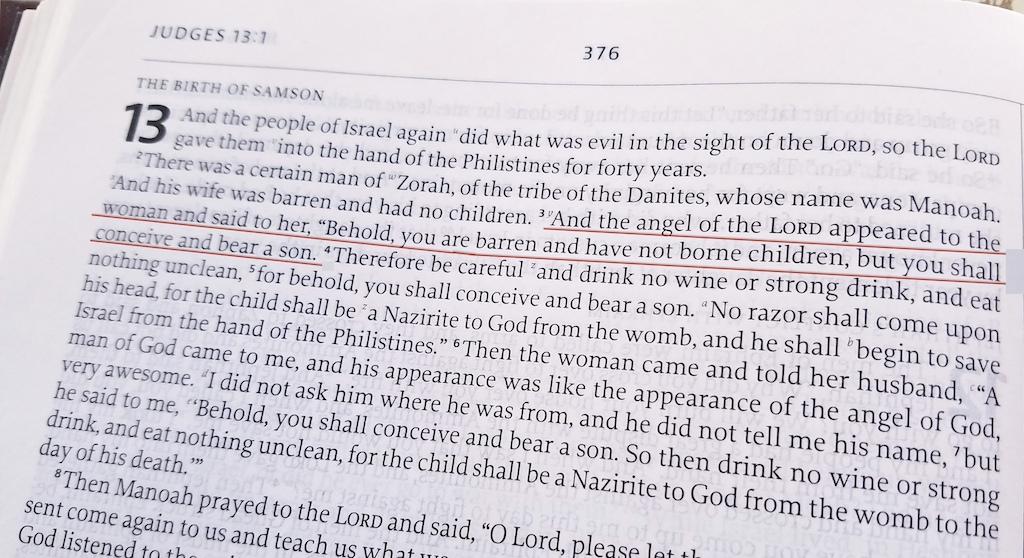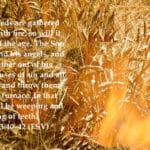Samson Part 1: Two Nativities
Scripture Readings: Judges 13:1-25; Romans 12:1-2
September 18, 2016 • Download this sermon (PDF)
Congregation of Christ: Last Sunday, we learned about Jephthah’s sinful vow to offer a burnt sacrifice to the Lord to gain his favor. God never required a vow in order to approve of a person’s request. And the tragic end to this vow is the burnt sacrifice turned out to be his only child, his own daughter.
 Today, we will study another kind of vow made by Israelites. But this vow was not made by a person, but was ordained by the Lord to save his people from oppression by their enemies. Samson was ordained by God as a Nazirite even before he was conceived. The Angel of the Lord appeared in human form and announced to Samson’s mother that she will “conceive and bear a son.” This child will be “a Nazirite from the womb… and he shall begin to save Israel from the hand of the Philistines.”
Today, we will study another kind of vow made by Israelites. But this vow was not made by a person, but was ordained by the Lord to save his people from oppression by their enemies. Samson was ordained by God as a Nazirite even before he was conceived. The Angel of the Lord appeared in human form and announced to Samson’s mother that she will “conceive and bear a son.” This child will be “a Nazirite from the womb… and he shall begin to save Israel from the hand of the Philistines.”
If these words sound familiar to you, it is because these are almost identical to the words of the angels who announced the birth of our Lord Jesus Christ to Mary and Joseph. So our theme today is “Two Nativities,” under three headings: first, The Birth of a Nazirite; second, The Birth of the Last Nazirite; third, Living a Nazirite Life.
The Birth of a Nazirite
As in the previous judges of Israel, our text opens with the familiar refrain, “And the people of Israel again did what was evil in the sight of the Lord, so the Lord gave them into the hand of the Philistines for forty years.” This was after Jephthah died. The next verse starts with the story of the birth of Samson the next judge through his parents, Manoah of the tribe of Dan and his unnamed barren wife.
What’s missing from these opening verses? In all the previous major judges, there is an account of the people crying out to the Lord to deliver them from the oppression of their enemies. In Samson’s narrative, there is no cry for God’s help. Apparently, the people had gotten used to bowing down to their enemies and co-existing with them as their masters. They had no need of God saving them. What salvation? We’re satisfied with our slavish life.
The next thing that happens is that “the angel of the Lord” appeared to the barren wife and tells her, “you shall conceive and bear a son.” But this son has a special mission: “he shall begin to save Israel from the hand of the Philistines.” The people might be satisfied with their slave life, but God was not. He couldn’t leave his people in their miserable condition, even if they were used to it. So the Lord set things in motion.
But how would this son start saving Israel? The angel of the Lord revealed to the woman that her son would be a Nazirite to God from her womb. But what was a Nazirite? The angel prohibited the woman from drinking wine or strong drink, and eating unclean food. But the angel only mentioned that her son should not cut his hair, apparently because Manoah and his wife knew what the Law of Moses says about a Nazirite. What about the requirement against eating unclean food? Again, this is probably because the Israelites, in their unbelief and rebellion against God, ignored the Law of Moses, including the eating of unclean food.
Numbers 6:1-21 deal with the requirements in being a Nazirite. The word Nazirite comes from a Hebrew verb which means “to separate” or “to consecrate.” The ideas of separation (vv. 1-8, 12, 13) and consecration (vv. 9, 11, 18, 19) are built into the word Nazirite. Throughout the period of his vow, the life of a Nazirite involves separation from three things: first, wine and grapes: everything from the grapevine, including wine, strong drink, vinegar made from wine, and grapes; second, cutting of hair on his head: his hair should be long; third, dead body or animal: touching or being near the dead will make him unclean.
Who can take the Nazirite vow? Any Israelite, man or woman, who wants to devote his or her life to God, can be a Nazirite. And Nazirite vows were usually for only a period of time.
Samson was a Nazirite from birth. Although the angel of the Lord did not say he would be a Nazirite for life, the woman said he will be “to the day of his death.” Samson was God’s gift to his childless parents and to Israel. As a judge in Israel, God gave him extraordinary physical strength, as long as his hair was uncut. So in this way, he began to save Israel.
It is striking that the angel of the Lord announced Samson’s birth twice only to Manoah’s wife even after Manoah prayed to the Lord to appear to him. The second time, the woman fetched Manoah to see “the man of God.” She thought that the angel of the Lord was only a man. Manoah then offered to prepare a young goat for the visitor as a show of hospitality, but the angel of the Lord refused. Instead, he asked for a burnt offering to the Lord.
Manoah then asked the Visitor’s name, and he answered, “it is wonderful.” Who else in the Bible is called “Wonderful”? In Psalm 139:6, the psalmist is overwhelmed with God’s knowledge of him—his thoughts, his activities, his whereabouts, everything about him. So he says, “Such knowledge is too wonderful for me; it is high; I cannot attain it.” The angel of the Lord was telling Manoah that he would not understand him, because he is too deep, too mysterious, too incomprehensible. This is why Paul exclaims, “Oh, the depth of the riches and wisdom and knowledge of God! How unsearchable are his judgments and how inscrutable his ways!” (Rom 11:33) And he also says that it is only through the Holy Spirit that we “may have strength to comprehend with all the saints what is the breadth and length and height and depth, and to know the love of Christ that surpasses knowledge” (Eph 3:18-19).
So this Angel of the Lord was no other than the Lord himself appearing in human form. When Manoah offered the burnt offering, the angel of the Lord went up in the flame of the altar. Such a terrifying sight made Manoah and his wife fall on their faces to the ground. They had seen God himself, and Manoah thought they would die! But his wife was more sensible: If God intended them to die, why would he announce that they would bear a son?
So Samson “the young man grew, and the Lord blessed him. And the Spirit of the Lord began to stir him.”
The Birth of the Last Nazirite
There was another man, John, who was born of a barren woman. He was “great before the Lord,” did not “drink wine or strong drink,” and was “filled with the Holy Spirit, even from his mother’s womb” (Luke 1:15). He wandered in the wilderness preaching a gospel of repentance (Matt 3:1-4). John the Baptist was a faithful Nazirite until he was martyred by King Herod.
But even if a Nazirite like John the Baptist is faithful during his days of separation, God will never share a covenant meal with him without sacrifices. A Nazirite’s best efforts, therefore, will never be enough to be righteous before God. His best animal sacrifices will never be sufficient to atone for his own sins, much less for the sins of others. What Israel needed, then, was a Nazirite who would fulfill all his vows perfectly all his life. He would then qualify as our perfect Nazirite, the perfect one who would be our sacrifice. He would be a once-for-all offering for all the sins of all God’s chosen people.
In Isaiah 9:6 is a prophecy of the birth of a Son, whose names will be Wonderful Counselor, Mighty God, the Everlasting Father, and the Prince of Peace. His birth was announced by the angel Gabriel to both his mother and his earthly father, since his Father is the Most High God. His name will be Jesus, because “he will save his people from their sins.” Samson was conceived by a barren woman, and this Son will be conceived by a virgin, also “barren” since she had no intimate physical contact with a man. Samson was probably named after the Egyptian-Canaanite sun-god Shemesh, but Jesus is also called the Sun of Righteousness.
John the Baptist was not this Nazirite, because he too was a sinner. He was only the forerunner to the last Nazirite. Why was Jesus the perfect Nazirite? Because he perfectly fulfilled the Nazirite’s vow of complete separation from sin and total consecration to God. Though he did not take the Nazirite vows, he revealed what a Nazirite could only foreshadow: Christ’s perfect righteousness all throughout his life.
He enjoyed the pleasures of wine, even turning water into wine at a wedding feast. But in the Last Supper, he showed us that the cup was not only for his enjoyment, but it was also the cup of God’s wrath that he would suffer so that his people would be acceptable to God. Though he cut his hair, he trusted God completely, saying, “But even the hairs of your head are all numbered” (Matt 10:30). And though he did not stay away from the dead—even actually raising many from the dead—he did so to show us that he has power to redeem us from sin and death.
Jesus the Nazarene became our last Nazirite because we who believe and trust in him will never be required to fulfill Nazirite vows or any vows of good works for our salvation. We will also be able to fulfill their vows of obedience to God because Christ will fill them with his Spirit. We will be separated, sanctified and transformed by the Spirit of Christ, as John the Baptist was in his days as a Nazirite.
And this child Jesus “increased in wisdom and in stature and in favor with God and man.” The Spirit of the Lord rested upon him at his baptism, “the Spirit of wisdom and understanding, the Spirit of counsel and might, the Spirit of knowledge and the fear of the Lord” (Isa 11:2).
Living a Nazirite Life
The Spirit-filled Nazirite life serves as mirror for you too. Each of the Nazirite’s three vows challenges you today in three ways:
First, abstaining from the fruit of the vine represents commitment to a sacrificial life. Jesus left his glorious pleasures in heaven to live a life of suffering on this earth. He was willing to do this in order for you to enjoy the glorious blessings of heaven. Are you willing to suffer for a little while looking forward to the glories that await us? Paul says in 2 Corinthians 4:17, “For this light momentary affliction is preparing for us an eternal weight of glory beyond all comparison.” And again Romans 8:18, “For I consider that the sufferings of this present time are not worth comparing with the glory that is to be revealed to us.” The greatest pleasures of this earthly existence can not even be an inkling of the glories of heavenly existence with God.
Second, letting God determine when a Nazirite could cut his hair represents giving control of our lives to God. When bad things happen in your lives, do you still trust God that he will use even sufferings and temptations to shape your character; that he will “work all things for your good”? Are you still able to pray, “Your will be done”? Are you still able to rest in God’s mercy, like Jesus in his hour of temptation, “not my will, but yours, be done”? Are you still able to trustfully declare that “nothing can separate you from the love of God in Jesus Christ our Lord”? Are you still able to claim that “not a hair can fall from my head without the will of my Father in heaven” (Heidelberg Catechism Q&A 1)?
Third, staying away from dead bodies represents our commitment to separate from sin and its deadly effects on our lives. Paul urges you in Romans 12:2, “Do not be conformed to this world, but be transformed by the renewal of your mind.” John adds to Paul’s exhortation in what we read earlier—that the love of the pleasures of this world is enmity against God, so you are not to love worldly things. The Nazirite life is a life of separation; so is your life as a believer in Christ. The Nazirite life is a life of distinction; so is your life as a believer in Christ a life that does not look like the life of unbelievers around you.
One of the saddest realities in today’s churches is that the lifestyle and attitudes of those in the church are not different from those outside the church. Jesus himself said in his priestly prayer in the Garden that you are “in the world… but not of the world” (John 17:11-15). You are to live your lives in this world, but your priorities, attitudes, and hope are not of this world.
Dear friends, do you acknowledge that like Samson the Nazirite, your best efforts to consecrate your life to God fail? Do you confess that there is nothing, even pledges and vows, you could do to remedy your sins, except if you trust Christ as your Savior and Lord? Samson broke his three vows of separation. The ancient ascetics, hermits and monks broke their vows of poverty, celibacy and good works. So you must not think that good works performed by Nazirites, priest and monks made them righteous before God. Only by repentance and faith in Christ are we righteous before a holy God.
Do you trust that only the Spirit of Christ can transform your life? From a life of worldly priorities, pleasures, and attitudes to a life that is looking towards heaven? Do you look to things that are unseen and eternal, and not on things that are pleasing to the eyes, and are passing away?



